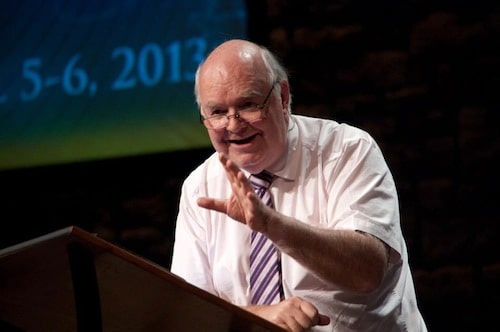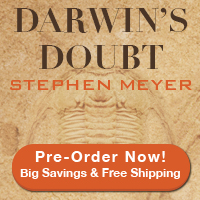 Evolution
Evolution
 Faith & Science
Faith & Science
Challenging Darwin at the Westminster Conference

Over the weekend, a number of us traveled to Philadelphia for the Westminster Conference on Science & Faith. The two-day event, which was a pack-out with nearly 800 attendees, featured notable speakers including John Lennox, Stephen Meyer, Douglas Axe, Paul Nelson, Vern Poythress, John West, Megan Best and Scott Oliphint. Over the course of Friday and Saturday, participants attended a total of three breakout sessions, with options of attending the science track, the theology and culture track, or the apologetics track. I decided to attend all three of the science breakout sessions, which featured Axe, Meyer and Nelson.
The first speaker at the event on Friday afternoon was Vern Poythress, who spoke on “Why the Beginning is Important and Why People Fight About It.” With the central themes of the origins debate thus introduced, attendees divided into their chosen concurrent breakout sessions. The first science breakout session was a lecture by molecular biologist Doug Axe, director of the Biologic Institute. Dr. Axe’s presentation covered a number of the challenges to neo-Darwinian evolution coming out of the experimental research on the origins of new protein folds and functions conducted by him and his colleagues. Following a dinner break, philosopher and mathematician Professor John Lennox of the University of Oxford (who has a new website) gave a lecture on the case for design as the best explanation for the origins of the universe. With his usual wit and humor, Lennox (pictured above) offered a rebuttal to Stephen Hawking’s book The Grand Design, a critique that he develops in more detail in his own book God and Stephen Hawking: Whose Design is it Anyway?.
On Saturday morning, Professor Lennox gave another lecture, this time on the origins of life. As Lennox explained, although he is not a biologist or an organic chemist, the question of life’s origin is a subject that comes closer to his own field of mathematics than the majority of other questions in biology. Unpacking the arguments from biological information, Lennox explained how functional information (since it carries meaning) possesses a semiotic dimension, and is thus not reducible to the material constituents of the informational medium. Since meaningful information is habitually associated with the activities of a conscious agent, Lennox argued, the nature of the information needed to explain life’s origin point towards the reality of an intelligent cause behind life. Lennox articulates his views on the subject in more detail in his book God’s Undertaker: Has Science Buried God?.
Doug Axe then gave a presentation on “the beginnings of a new biology based on design,” which attempted to offer a new way of looking at life — a new paradigm to replace neo-Darwinism, focusing on design or engineering principles that operate in life. The science breakout session that followed was presented by Dr. Stephen Meyer, and focused on the central thesis of his book Signature in the Cell (i.e. that the origin of the biological information needed to explain life is best explained by intelligent design). Meyer talked about how he himself had come to this conclusion and described the uniformitarian scientific principles on which the inference is based (the method of inference to the best explanation from multiple competing hypotheses first pioneered in Charles Lyell’s book Principles of Geology). Following lunch, Meyer gave another lecture on the subject of his forthcoming book Darwin’s Doubt, the challenge of the Cambrian explosion to neo-Darwinian evolution. Meyer’s new book, which is definitely a must-read for anyone interested in the ID debate, can be pre-ordered here (including a steep discount and four complementary e-books if you order by the end of April).
The last talk of the day (another science breakout session) was by Paul Nelson, who lectured on the prohibitive difficulty of evolving a new animal body plan due to the uniformly deleterious nature of early-acting mutations.
All things considered, the conference was a huge success, and there were some lively Q&As following the presentations. You couldn’t miss the crowds surrounding the speakers following their talks. If you didn’t make it to the conference this time around, a DVD of the event is being produced, and there is always next year’s event to attend.
